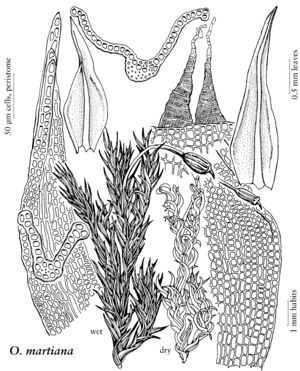Oreas
Bryol. Univ. 1: 380. 1826 ,.
| Taxon | Illustrator ⠉ | |
|---|---|---|
 | Oreas martiana | Patricia M. Eckel |
Plants in dense cushions, yellow-green distally, brown and compacted with redbrown radicles proximally. Stems forked. Leaves erect-spreading, crisped when dry, lance-acuminate, keeled, ending in a sharp, hyaline cell or short point; margins 2-stratose and narrowly revolute nearly to the apex, entire or somewhat irregular; costa prominent at base, smooth, ending near the leaf apex, entire to shortly excurrent; distal cells irregularly roundedquadrate, smooth, thick-walled; basal-cells narrowly rectangular, thick-walled, the alar cells not differentiated. Sexual condition autoicous; perigonial buds minute, at base of perichaetium; perichaetial leaves similar to stem-leaves, ending in a short, hyaline awn. Seta straight or somewhat curved when dry, cygneous when moist, yellow. Capsule mostly erect when dry, pendent when moist, short-necked, symmetric, subglobose but becoming broader at the mouth and somewhat contracted at the middle when dry, orangebrown, strongly ribbed; annulus persistent; operculum obliquely rostrate from a convex base; peristome teeth inserted slightly below the mouth, lance-acuminate, brown at base, entire or occasionally somewhat perforated, rarely cleft, yellowish-brown above, pale at the slender tips, vertically striolate throughout. Calyptra cucullate, smooth. Spores warty-papillose, brown.
Distribution
North America, Europe, Asia
Discussion
Species 1.
Oreas much resembles Cynodontium, but has a cygneous seta (when moist) and symmetric capsules. European specimens are more slender, with shorter leaves, but the differences are not significant.
Selected References
Lower Taxa
"broader" is not a number.